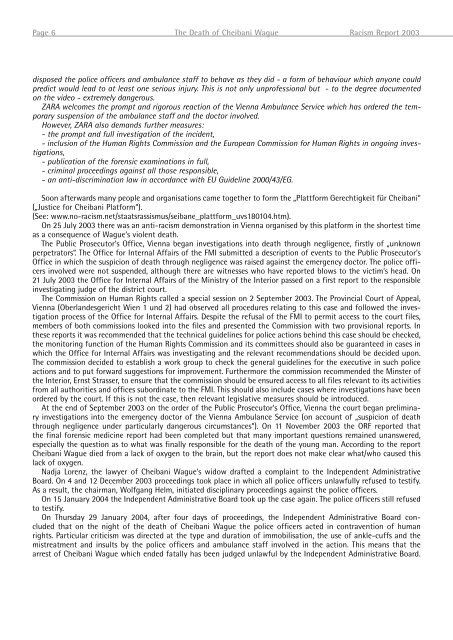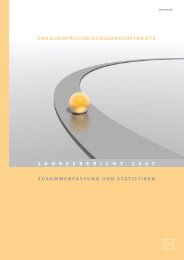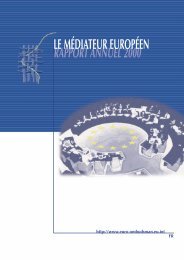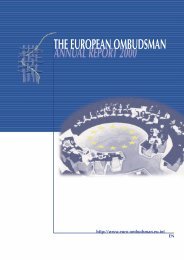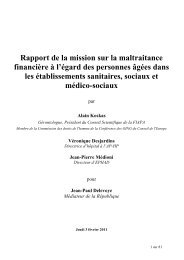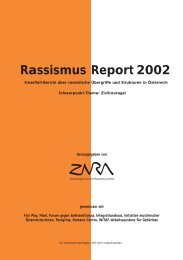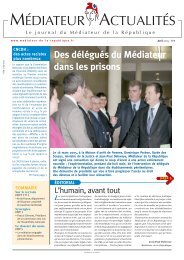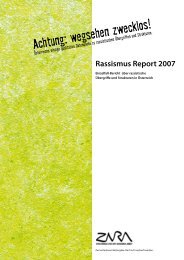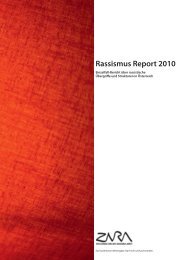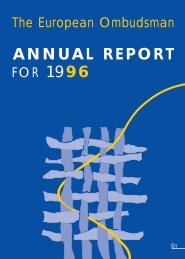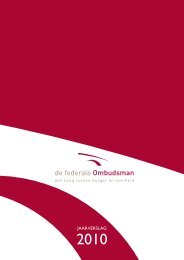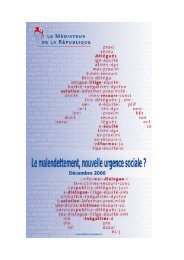Racism Report 2003 - Zara
Racism Report 2003 - Zara
Racism Report 2003 - Zara
You also want an ePaper? Increase the reach of your titles
YUMPU automatically turns print PDFs into web optimized ePapers that Google loves.
Page 6 The Death of Cheibani Wague <strong>Racism</strong> <strong>Report</strong> <strong>2003</strong>disposed the police officers and ambulance staff to behave as they did - a form of behaviour which anyone couldpredict would lead to at least one serious injury. This is not only unprofessional but - to the degree documentedon the video - extremely dangerous.ZARA welcomes the prompt and rigorous reaction of the Vienna Ambulance Service which has ordered the temporarysuspension of the ambulance staff and the doctor involved.However, ZARA also demands further measures:- the prompt and full investigation of the incident,- inclusion of the Human Rights Commission and the European Commission for Human Rights in ongoing investigations,- publication of the forensic examinations in full,- criminal proceedings against all those responsible,- an anti-discrimination law in accordance with EU Guideline 2000/43/EG.Soon afterwards many people and organisations came together to form the „Plattform Gerechtigkeit für Cheibani“(„Justice for Cheibani Platform“).(See: www.no-racism.net/staatsrassismus/seibane_plattform_uvs180104.htm).On 25 July <strong>2003</strong> there was an anti-racism demonstration in Vienna organised by this platform in the shortest timeas a consequence of Wague‘s violent death.The Public Prosecutor‘s Office, Vienna began investigations into death through negligence, firstly of „unknownperpetrators“. The Office for Internal Affairs of the FMI submitted a description of events to the Public Prosecutor‘sOffice in which the suspicion of death through negligence was raised against the emergency doctor. The police officersinvolved were not suspended, although there are witnesses who have reported blows to the victim‘s head. On21 July <strong>2003</strong> the Office for Internal Affairs of the Ministry of the Interior passed on a first report to the responsibleinvestigating judge of the district court.The Commission on Human Rights called a special session on 2 September <strong>2003</strong>. The Provincial Court of Appeal,Vienna (Oberlandesgericht Wien 1 und 2) had observed all procedures relating to this case and followed the investigationprocess of the Office for Internal Affairs. Despite the refusal of the FMI to permit access to the court files,members of both commissions looked into the files and presented the Commission with two provisional reports. Inthese reports it was recommended that the technical guidelines for police actions behind this case should be checked,the monitoring function of the Human Rights Commission and its committees should also be guaranteed in cases inwhich the Office for Internal Affairs was investigating and the relevant recommendations should be decided upon.The commission decided to establish a work group to check the general guidelines for the executive in such policeactions and to put forward suggestions for improvement. Furthermore the commission recommended the Minster ofthe Interior, Ernst Strasser, to ensure that the commission should be ensured access to all files relevant to its activitiesfrom all authorities and offices subordinate to the FMI. This should also include cases where investigations have beenordered by the court. If this is not the case, then relevant legislative measures should be introduced.At the end of September <strong>2003</strong> on the order of the Public Prosecutor‘s Office, Vienna the court began preliminaryinvestigations into the emergency doctor of the Vienna Ambulance Service (on account of „suspicion of deaththrough negligence under particularly dangerous circumstances“). On 11 November <strong>2003</strong> the ORF reported thatthe final forensic medicine report had been completed but that many important questions remained unanswered,especially the question as to what was finally responsible for the death of the young man. According to the reportCheibani Wague died from a lack of oxygen to the brain, but the report does not make clear what/who caused thislack of oxygen.Nadja Lorenz, the lawyer of Cheibani Wague‘s widow drafted a complaint to the Independent AdministrativeBoard. On 4 and 12 December <strong>2003</strong> proceedings took place in which all police officers unlawfully refused to testify.As a result, the chairman, Wolfgang Helm, initiated disciplinary proceedings against the police officers.On 15 January 2004 the Independent Administrative Board took up the case again. The police officers still refusedto testify.On Thursday 29 January 2004, after four days of proceedings, the Independent Administrative Board concludedthat on the night of the death of Cheibani Wague the police officers acted in contravention of humanrights. Particular criticism was directed at the type and duration of immobilisation, the use of ankle-cuffs and themistreatment and insults by the police officers and ambulance staff involved in the action. This means that thearrest of Cheibani Wague which ended fatally has been judged unlawful by the Independent Administrative Board.


